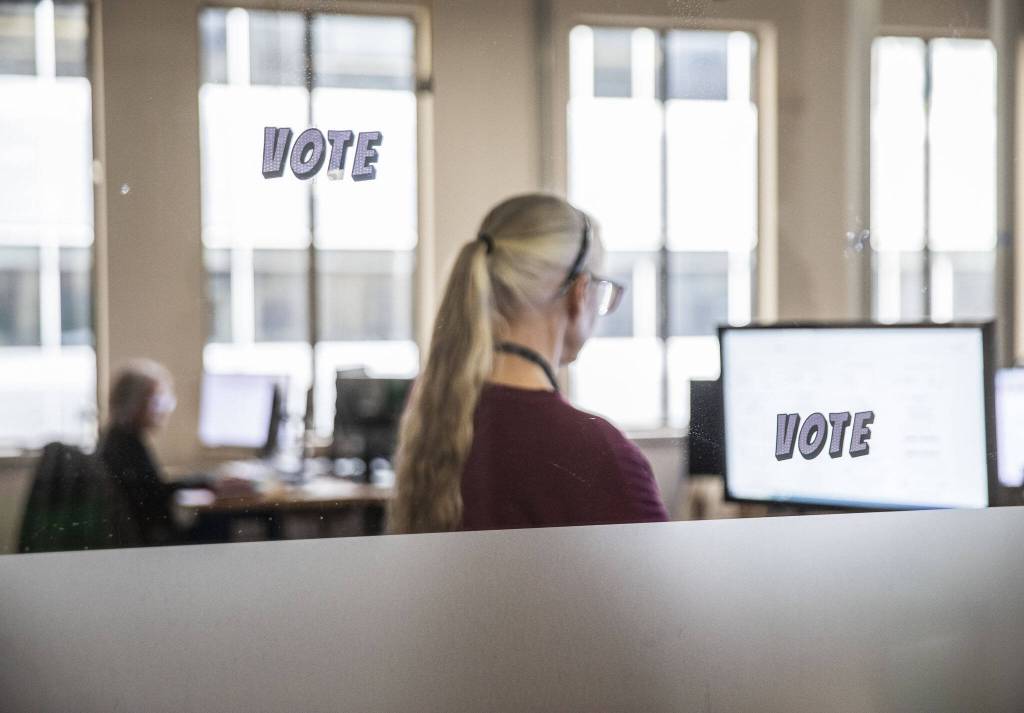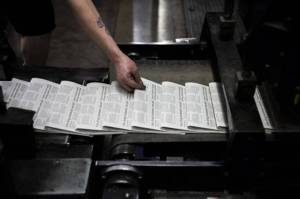Editorial: Trump order, SAVE Act do not serve voters
Published 1:30 am Saturday, April 19, 2025


By The Herald Editorial Board
Whether coming from Congress through legislation or from the Oval Office through executive orders, Americans should be wary of solutions that are scrambling to find a problem.
Especially when dubious fixes pose threats to the most foundational rights of Americans.
That’s the case with the recent passage in the House of the SAVE Act — Safeguard American Voter Eligibility Act — and in President Trump’s issuance last month of an executive order, both of which seek to require proof of citizenship for those registering to vote, among other rummaging-around-for-problems provisions.
Still smarting from the fact-checks and clear evidence that the 2020 presidential election — in the words of the Trump administration’s then-head of cybersecurity that the election — “was the most secure in American history,” Trump and Republicans in Congress have dredged up old and unfounded fears of ineligible voters and election fraud to justify new regulations that, rather than making elections more secure, threaten to disenfranchise legitimate voters, discourage eligible Americans from registering to vote, and make voter registration and elections more cumbersome and expensive for states to run.
Unable to wait a couple of weeks for a Republican-controlled Congress to act, Trump leaped in with an executive order in late March that would require documentary proof of citizenship, such as a birth certificate, naturalization certificate, passport or enhanced driver’s license; and — under the threat of losing federal funding — require states to disqualify mail-in ballots received after Election Day, require new standards for voting machines and turn over state voter rolls for federal review.
In the attempt to curb voter fraud — something that research and court cases have repeatedly shown to be too infrequent and minimal to have had any effect on election results — Trump’s order and the SAVE Act seek an unnecessary requirement that will at best complicate voter registration for millions of Americans while effectively barring others from exercising that right.
The Brennan Center for Justice, which advocates for voter access, last year estimated that 21.3 million American citizens — 9.1 percent of those of voting age — don’t have ready access to their citizenship documents.
Additionally, such a requirement would make it harder for millions of other Americans, mainly women, who — because of marriage or other circumstances — have different last names than those shown on their birth certificates.
Trump’s order also requires a review and replacement of voting equipment to standards that could cost each state $1 billion or more to replace and likely couldn’t reasonably be accomplished before the order’s deadline for the 2026 midterm elections.
Also under Trump’s order, hundreds of thousands of Washington state residents, legally registered to vote and having submitted mail-in ballots by Election Day may find their ballots have been rejected if they are not received by Election Day.
Washington Secretary of State Steve Hobbs, in a news release following Trump’s order, noted that more than 250,000 legitimate ballots — postmarked on or before 2024’s General Election day — were received in the days following the election.
“Had this rule been in effect, those voices would have been silenced, especially in rural areas where mail delivery can take longer,” the statement said.
Washington is one of 18 states — as well as Washington, D.C., Puerto Rico and the Virgin Islands — that counts ballots, which have been postmarked on Election Day or before, in the days after an election.
Hobbs also warned that the president’s order requires a federal review of state voter list maintenance practices and places that review under the authority of the Department of Homeland Security and Elon Musk’s Department of Government Efficiency, usurping a responsibility entrusted to the states and carried out by nonpartisan and trained professionals.
Among all the floundering to cure a virtually nonexistent problem is the fact of the limited authority of Congress —and the complete lack of jurisdiction for the president — to determine voter and election laws.
John J. Martin, an assistant professor of law for the University of Virginia, explains in an article for The Conversation, that the SAVE Act poses a constitutional dilemma; by requiring individuals to show proof of citizenship, Congress is establishing a voting requirement for federal elections when it does not have the constitutional mandate to make that law. That constitutional power is held exclusively by each state.
While Congress has the power to regulate the times, places and manner for federal elections, Martin points to a 2013 U.S. Supreme Court precedent that clarified that Congress’ authority is limited to the elections themselves and not the qualifications of voters. The 7-2 decision, written by Justice Antonin Scalia, noted that nothing in the Constitution “lends itself to the view that voting qualifications in federal elections are to be set by Congress.”
President Trump has even less authority to exert control over elections; with the exception of his own ballot.
It’s why Washington state and Oregon have filed suit against the Trump administration, challenging the executive order on the grounds that the states — and not a president — have the constitutional mandate to run elections. That suit now has been joined with similar lawsuits filed by voting rights groups and national Democrats in a Washington, D.C., federal court. U.S. District Court Judge Colleen Kollar-Kotelly said Thursday she is considering responses to her questions before ruling next week regarding a preliminary injunction.
Meanwhile, the SAVE Act is now before the Senate.
Neither the SAVE Act nor Trump’s executive order are intended to solve an actual problem. For congressional Republicans, the SAVE Act is a performative appeal to Trump and his base. For Trump, his order feeds a grievance over his loss of the 2020 election and the determination by Christopher Krebs, then the head of the Cybersecurity and Infrastructure Security Agency, that the Nov. 3, 2020, election between Trump and Joe Biden “was the most secure in American history.”
Trump fired Krebs soon after; by tweet. Yet, still nursing hostilities, the president last week revoked the security clearances for Krebs and another former Department of Homeland Security official and ordered the Department of Justice to investigate the work of both. Four years later.
Trump’s order, then, is a solution; in service of a grudge.




